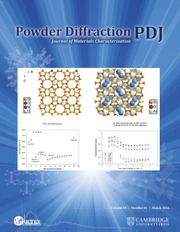Article contents
Study of crystallite size and strain as a function of morphological evolution in zinc oxide powder obtained from hydroxycarbonate precursor
Published online by Cambridge University Press: 05 March 2012
Abstract
In this work, zinc oxide samples were obtained from hydroxycarbonate by thermal decomposition at 300 °C. Zinc hydroxycarbonate samples were produced by homogeneous precipitation over different periods of time. The method used to obtain zinc oxide produces different morphologies as a function of the precursor precipitation time. Among the obtained particle shapes were porous spherical aggregates, spherulitic needle aggregates, and single acicular particles. This work investigated spherulitic needle-aggregate formation and the correlation among morphology, domain size, and microstrain. Transmission electron microscopy data revealed that the acicular particles that form the spherulitic needle aggregates consist of nanometer crystallites. Apparent crystallite size and microstrain in the directions perpendicular to (h00), (h0l), (hk0), and (00l) planes were invariable as a function of precursor precipitation time. From the results, it was possible to conclude that the precursor precipitation period directly influenced the morphology of the zinc oxide but did not influence average crystallite size and microstrain for ZnO samples. Therefore, using this route, it was possible to prepare zinc oxide with different morphologies without microstructural alterations.
Information
- Type
- Technical Articles
- Information
- Copyright
- Copyright © Cambridge University Press 2001
References
- 6
- Cited by

